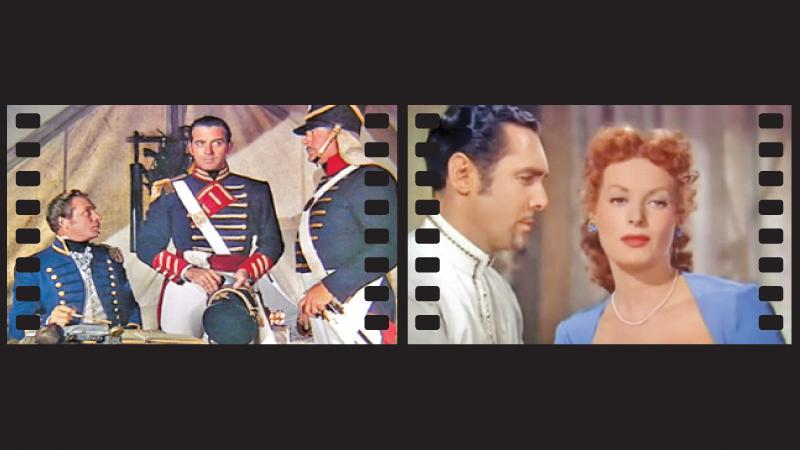
Directed by Will Price and written by Winston Miller, ‘Tripoli’, is a Hollywood action adventure movie from 1950 with screen legends Maureen O’Hara and John Payne in the role leads. Tripoli is a fictionalised narrative of the Battle of Derna, a coastal town in modern eastern Libya in 1805, and delivers a facet of the golden age of Hollywood.
The story is set in a time when the US navy has its presence in the Mediterranean waters to end the tide of pirates who were attacking merchant ships off the coast of Tripoli. On the directive of the US president, a small force of US Marines of the USS Essex, one of the US naval ships keeping guard on the waters, is deployed on a mission to Alexandria that involves setting the groundwork for an attack on the fortified town of Derna and to overthrow the current ruler, the Pasha and instal his dethroned brother who lives in exile.
The elite team led by Lt. Presley O’Bannon, played formidably by Payne, encounters a diverse melange of characters along their path that add humour, intrigue, enticement and vigour to the narrative. Payne plays the typical steadfast ‘soldier to the core’ set on fulfilling his designated mission without giving into obstacles that range from insufficient water, to sandstorms to threats of mutiny by the local ‘soldiers’ who are enlisted to fight as mercenaries. In this curious set of circumstances one finds the enchanting Countess Sheila D’Areneau, played by Maureen O’Hara, who lives in the opulent camp of the exiled Pasha, and is presumed by everyone to be his mistress, while she is actually angling to get him to marry while not giving into his amorous advances.
O’Bannon finds himself allured by Countess D’Areneau and she in turn finds herself secretly attracted to O’Bannon but both refuse to admit it to themselves, as they are set on achieving goals that are not aligned with each other’s. The Countess sees the mission as one that will jeopardise her goal since if the expedition to capture Derna fails and result in the death of Hamet, the exiled Pasha, her plan to become his wife will end. She instead wants to persuade him to marry her and go to Europe and live off the wealth he possesses in the form of jewels and gems, rather than risking his life to reclaim his throne.
The Countess convinces Hamet that the Americans plan to turn him over to his brother, and tries to get him to stay out of battle. But O’Bannon insists the terms of the treaty signed by Hamet must be honoured and that he must accompany the assembled force to capture Derna, which is a military and political operation that will receive the support of the US navy, which will launch an attack of cannon fire upon the fortified city from the coastal waters. O’Bannon’s firmness gets Hamet to concede and the result is that the countess too accompanies the expedition going across the North African deserts. The journey and the mission unfolds hidden bursts of passion, treachery, political subterfuge, military manoeuvrings, steadfastness of resolve, and an unexpected heroism for love and integrity on the part of the countess who rides out to warn O’Bannon at the eleventh hour as they prepare to launch the attack on Derna that Hamet plans to double-cross the US forces as he has accepted a secret overture from his brother to share the kingdom as equal rulers in return for betraying the Americans.
A daring bid for the overthrow of Derna unfolds, creating aggressive military engagements. O’Bannon shows his ‘courage under fire’, and finally leads the way to a victory for the Americans. The end brings the Countess and O’Bannon together as a couple who finally declare their love for each other. ‘Tripoli’ isn’t merely as a ‘war movie’ but a story that weaves the drama of politics into an action adventure set in the context of a military objective being pursued. For those who enjoy the golden age of Hollywood’s action adventure genre, Tripoli will not disappoint.
